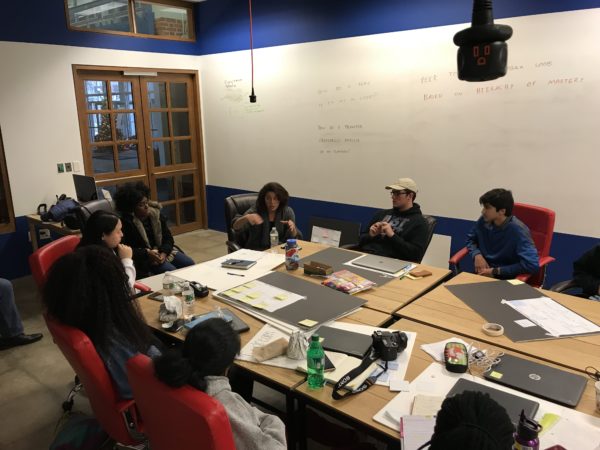Eva* came to the US in her early 20s from western Africa. She found herself in an abusive marriage, unemployed, and dependent on her husband. Then she got pregnant. Only a “good job” – the kind you have to apply for online, the kind where you need to use Excel formulas – could help her earn enough support her son alone.
After six months of free Byte Back classes, she was computer savvy, certified, and ready. She got hired for an office job, and escaped her husband. Tech brought Eva independence and security.
Twenty years ago, Byte Back founders Glenn Stein and Barbara Altman saw that unemployed adults in Washington, D.C., could find unique economic opportunities through IT career training.
Before we all had smartphones, Stein saw that tech careers offered a pathway to the middle class.
Byte Back, the organization Stein founded, is here in D.C. 20 years later, offering free tech training and career preparation to adults left behind by advancing technology.
Many things have changed in 20 years, but tech skills still offer one of the best pathways to living-wage jobs. Join us to find out more! https://t.co/8lCGAqGQ9P pic.twitter.com/WLbN7FC5Os
— Byte Back (@We_ByteBack) February 18, 2018
In the 1990s, tech skills were one path out of poverty. Now they’re rapidly becoming the only path.
Today, “the digital divide is particularly stark among D.C.’s low-income, working poor, and unemployed populations,” DC’s Office of the Chief Technology Officer recently reported. Although more people have internet access, the divide still exists. In the last 10 years, home broadband access in Ward 5, 7, and 8 residents has increased, from less than 40 percent with access to 65 percent. But 160,000 still don’t have home internet. Unequal access affects their ability to participate in the digital economy.
More jobs than ever require tech skills. Research from the Brookings Institution shows that 28 million low-tech jobs in the US have disappeared – eliminated completely or requiring a higher level of skills.
Byte Back students have felt this shift and been left behind by digitalization of the workforce. “I felt like technology had grown up around me, and I was in a losing battle,” Byte Back graduate Demika said.
Hard-working people who didn’t grow up with technology and didn’t have the time or money to learn later are, at best, in low-tech jobs that pay less than half of high-digital positions. At worst, they are struggling with unemployment.
We no longer have the luxury of saying that you can change your life with tech skills. Now we have to say, “If you want to change your life, you MUST have tech skills.”
Cities like Washington, D.C., also face a massive challenge of inclusion, reflected by our higher than average digitalization rate and the city’s expansive wage gap. Many in our community are benefiting from high-tech industries, but thousands are left out with little hope of ever moving up. We can’t just leave them behind.
In our twentieth year, Byte Back is expanding work as a leader in the community to close the digital divide. Along with technology, we’ve advanced by adapting our curriculum to give students the skills for the tech jobs of today.
As D.C. becomes increasingly unaffordable for low-wage workers, tech career training is in higher demand in Maryland. So, we recently expanded into Prince George’s County. We also moved into a new D.C. headquarters this year with state-of-the-art classrooms near Union Station.
We’re focused more than ever on the most transformative result of digital equity – eliminating poverty. While our city’s shelters, food banks, and other workforce training programs are doing amazing work, we recognize that the power of tech training is as unique and effective as it was 20 years ago. It can be permanently transformative for adults facing a lack of economic opportunity.
This year, 60 Byte Back students started life-changing careers. As we start our third decade in D.C., we’re ready to equip hundreds and thousands more with digital skills for their future.
To help put tech skills and living-wage careers within reach, learn more about Byte Back’s work, volunteer or connect a graduate with an internship or job. Start by joining us Thursday, March 22, for our Twentieth Year Celebration.
*Name changed to protect identity
Join the conversation!
Find news, events, jobs and people who share your interests on Technical.ly's open community Slack

DC daily roundup: Esports at Maryland rec center; High schoolers' brain algorithm; Power data centers with coal?

DC daily roundup: Tyto Athene's cross-DMV deal; Spirit owner sells to Accenture; meet 2GI's new cohort

DC daily roundup: $10M to streamline govt. contracting; life sciences might dethrone software; Acadia's new $50M

